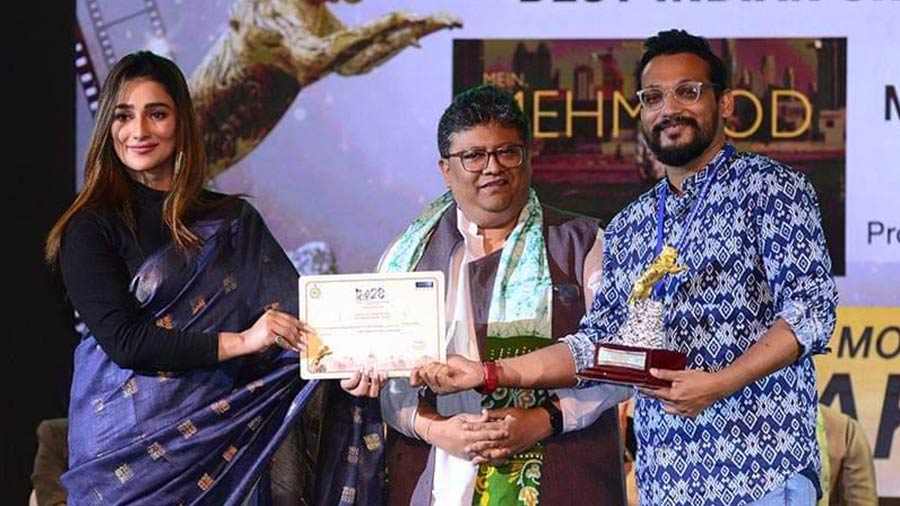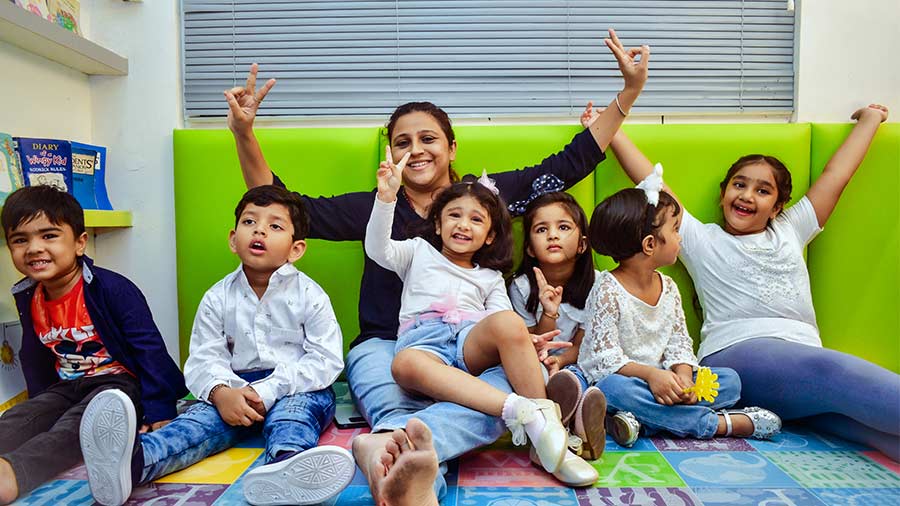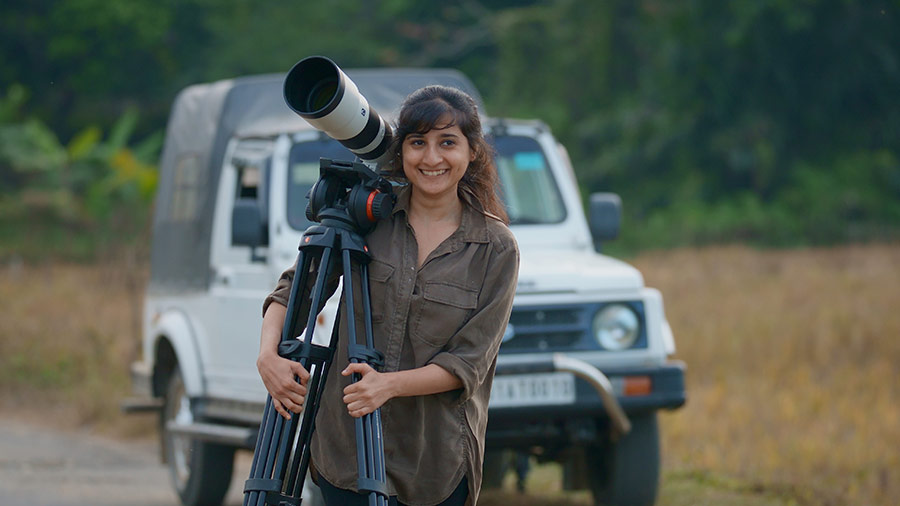Empathy is the key to Prataya Saha’s films. An independent filmmaker based out of India and the UAE, Saha has travelled to more than a 100 film festivals across the world before winning the Best Short Film award for his latest film Mein, Mehmood (I Am, Mehmood) at the 28th Kolkata International Film Festival.
A film dealing with the anxiety of an immigrant for not knowing English in a foreign land, Mein, Mehmood encompasses the difficulties faced by immigrants all over the world while trying to integrate into a host culture. Tracing the journey of Mehmood, a middle-aged Indian immigrant in Dubai, the film tells the story of a salesman struggling hard to reach his monthly sales targets owing to his lack of English language skills. While he strives hard to keep his job, he is constantly reminded of the family that he has left behind and of the daughter whose education depends on the money that he sends back home.
Saha’s 12 short films have been shown at New York Asian Film Festival, Cardiff International Film Festival, Chicago South Asian Film Festival and the Flickers' Rhode Island International Film Festival, among others. Mein, Mehmood alone has won around 26 awards.
My Kolkata caught up with Saha as he traced his journey of becoming a filmmaker who is constantly driven by his empathy for those whose stories are usually forgotten and his unbreakable bond with the city.
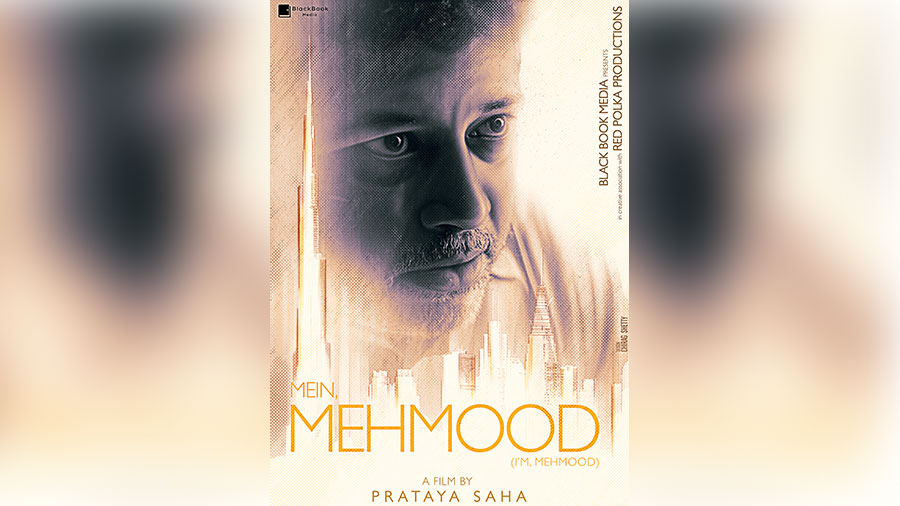
The poster for 'Mein, Mehmood'
Tell us about your journey as an independent filmmaker.
I started off as a filmmaker quite accidentally. But it was also something that happened naturally. As a kid, I grew up trekking and I saw old Polaroid photographs of the virgin Himalayas that inspired me quite a bit. That’s when I developed a knack for photography. I worked as a part-time photographer while studying engineering. I even worked as a theatre photographer in Bangalore on weekends after my regular work. I also used to write –– I wrote my first poem at the age of four. When I went to London for work, I realised that people give a lot of respect to art whether you earned a lot of money or not. My attitude towards art changed. So, I decided to come back to India and start something fresh.
Your film (Mein, Mehmood) portrays an immigrant’s anxiety about not knowing English in the UAE. Did any of your personal experiences/ interactions with the immigrants inspire the story? If yes, please tell us more.
I think the best films are always based on the writer or director’s personal experiences. I was in the corporate world from 2010 to 2018 and I was able to travel a lot because of it. In the UAE, I used to travel in taxis, shared taxis, and buses and I used to come across Asian immigrants in Dubai. Most of the people who use public transport are Asian immigrants who come there to work from Pakistan, Bangladesh, India, and the Philippines, etc. Initially, they came across as reserved but then when I probed a little deeper I understood that one of the reasons why they didn’t talk a lot was because they were scared of being judged for not knowing English since English is the lingua franca. I have chatted with Bangladeshi taxi drivers who have told me that they feel shy talking to other people because they don’t want to be judged for not knowing English. I am not against any particular language but if a person is judged for not knowing one language out of the 6,500 languages that there are, then it becomes a problem.
English, as a language, remains one of the most commonly used languages in the world. However, like the protagonist in your story, many are not fluent in it, leading them to be discriminated against. How do you think this can be addressed?
My research showed that people had less access to basic healthcare because they did not know English. How can that be a barrier? So this is where things I believe need to change. We need to be empathetic and we need to understand. All languages have undergone thousands of years of evolution, are beautiful and they have their history. So why should people be discriminated against for not knowing a particular language? I have seen that in my own country as well. People try to dismiss people who are not able to speak English. English was the language of our colonisers and to be a part of the administration one needed to know English. However, that scenario is over. I believe, using English where it is necessary is fine but one should not be forced to know English when it is not required. One more reason that I wanted to do this film is that there are so few films on the subject. It seems that this discrimination is so rampant and prevalent that we have taken it for granted.
In terms of filmmaking as an art, which filmmakers or directors are you most inspired or influenced by?
Satyajit Ray, anytime. I did not watch too many Satyajit Ray movies when I was younger but as I started delving into filmmaking, I was left spellbound by his craft. He did not even know how to make films when he made Pather Panchali — he was just experimenting and then he made a film like that. So, Satyajit Ray has been an inspiration for me because I work with a lot of non-actors and theatre actors much like how Ray picked up a lot of theatre actors and worked with a lot of non-actors, especially at the beginning of his career.
When it comes to Hollywood, I am inspired by Martin Scorcese. I think he is a brilliant director and I think I have watched almost all of his films. I do like Nolan, Fincher, and James Cameron – but if there’s one director who has changed my outlook on filmmaking it is Satyajit Ray.
In your films, you speak about the plight of those whose stories remain otherwise overlooked. For instance, you have spoken about the housewife whose love remains unreciprocated in The Good Wife, a pregnant domestic abuse victim in Just Another Day, or the anxious immigrant in I am Mehmood – how do these stories come to you, and what makes you believe that the audience will be interested in them?
There needs to be someone who tells their stories. I believe in empathy as a human being. As a human being if you’re not able to show empathy or if you’re not able to understand the other person’s happiness or pain by putting yourself in another person’s shoes then what kind of a human being are you? One of the biggest reasons I do these stories is because very few people pick up these stories. You mentioned Just Another Day which was about abuse during pregnancy and when I was researching, I realised that not many people had done films on it. One of the major reasons for abuse during pregnancy remains the husband’s jealousy of the unborn child… and I was shocked reading about it. When I make films, I take a very simplistic approach because I want my stories to touch hearts.
When Darlings was released and someone told me that it also showed violence during pregnancy, I was happy that a mainstream Bollywood film was talking about it. If you research enough, you’ll find that abuse during pregnancy is everywhere — in developed countries and developing countries alike.
Your film has won the best short film award at the Kolkata International Film Festival. Tell us a little bit about the connection that you share with the city.
KIFF is a huge platform and this is the first time that I am winning an award in Kolkata. It has been an overwhelming experience for me. I was in Europe at the time, and I cut my trip short to be here when I heard my film had won — that’s the kind of connection I have with Kolkata. I was born and raised here, so Kolkata always feels like home; the streets and smells are familiar and it always feels great to be back. I lived here for 18 years, did my schooling at Calcutta Boys’ School, and then did my engineering in Karnataka. This is what I said on stage as well — this is one of the best things to have happened.
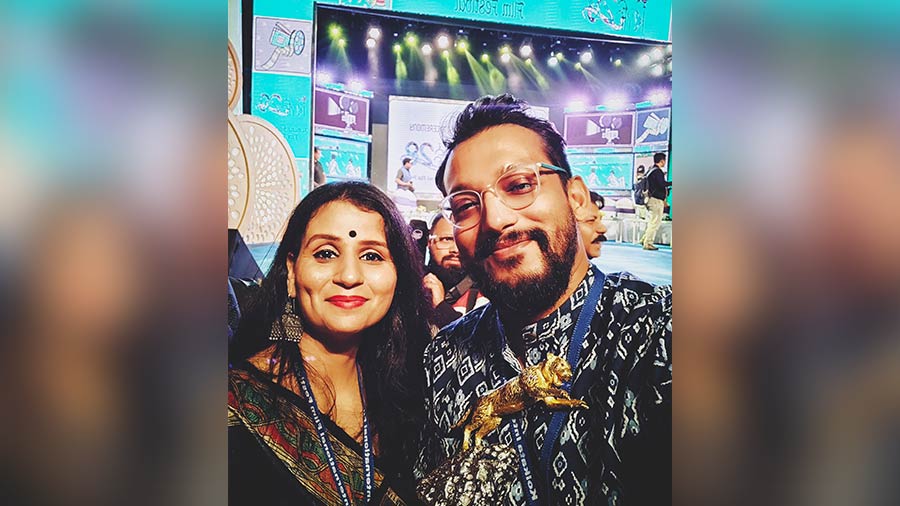
Prataya Saha with Anshulika Kapoor who plays 'the wife' in 'Mein, Mehmood'
What do you think is the future of independent filmmaking?
I think the future is great. The attention span of people is decreasing, so short episodes and short films are becoming a more popular choice. I think after the pandemic, with the emergence of OTTs finally you can be in a situation where you are not only able to showcase your film but you’re also able to distribute your content. We are also coming to a scenario where you can earn money from it as well if you are smart about your post-production marketing plan and strategy.
What are some of your upcoming plans or projects?
I just shot my first Bengali film last March called The Golden Cage which features Anshulika Kapoor, who was also in Just Another Day. It also has Debo Prasad Haldar and Sounak Sen Barat. The film is set in 1989 and talks about how an elder brother, his wife, and his younger brother live in a palatial house, which is now crumbling. They are wondering whether to sell the house to a promoter. Incidentally, the house that we were shooting in is in a similar predicament. This is a story that I have grown up seeing with so many old buildings being sold off after the families broke apart.
The film will be sent to different film festivals next month and since this is my first Bengali film I would also love to screen it here!
Quick Four
Favourite film
Devi, Satyajit Ray
Favourite actor/actress of all time
I am a big fan of Jessica Chastain
One thing about Kolkata I miss the most
The food. I miss the prawns and ilish (hilsa). The quality of ilish (hilsa) that you get here cannot be found anywhere else!
One passion/hobby apart from filmmaking
I am a photographer. I love photography and have kept it as a hobby.
